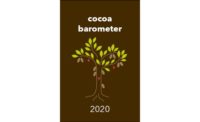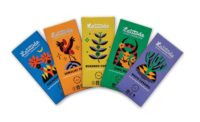The United Nations Development Programme and the FairChain Foundation have created The Other Bar, a chocolate bar that challenges consumers to take direct action against poverty.
Launching on Oct. 14, this experiment pilots a new way of doing business with producers in the developing world. Farmers only get 3 percent of the value of the cocoa used to make the chocolate sold in shops, which leads to the majority of cocoa farmers not earning living incomes. The Other Bar ensures farmers are paid prices that meet real income needs — and they receive it faster.
Inside every pack is a QR-code token that has real value — when scanned it’s equivalent to a quarter of a cocoa-producing tree. So, for every four bars bought, a farmer can grow more, earn more and feed their family thanks to a fairer system.
There’s a twist, chocolate lovers don’t have to spend the token on a tree, they could use it to get 25 pence off their next purchase. It’s their choice. If more chocolate is purchased, the farmer benefits, if the token is donated, the farmer benefits — that’s Radical Equality in action.
“This experiment is a blueprint on how to tackle poverty,” said Carlo Ruiz, head of UNDP Inclusive Economic Development Unit in Ecuador. “It’s a game-changer because we can prove to multinationals and governments that there is consumer demand for a fairer way.”
Available in milk or dark chocolate, The Other Bar is made from pure, organic Ecuadorian cocoa. Each pack contains two 50-gram bars. A limited-edition 20,000 first run of The Other Bar, priced at £2.99 ($3.68), will go on sale online at www.theother.bar on Oct. 14.
Guido van Staveren, founder of the FairChain Foundation, conceived the idea and developed the technology behind The Other Bar token.
“Most consumers understand that there is a problem with the way business is conducted between multinationals and producers,” he said. “The little guy gets poor, while the big guy gets rich. The Other Bar proves that a combination of technology and consumer choice can tackle poverty.
“Global brands spend more than £500 billion a year on marketing. We only need £140 billion to end global poverty. So how cool would it be if manufacturers invested some of their marketing cash on positive impact? We believe this is what consumers want.”






